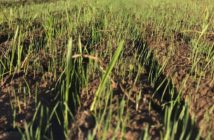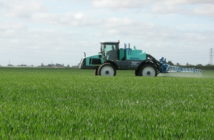A new study conducted at Nottingham University has shown that treating bean and pea seeds with a biostimulant seed treatment can improve germination by up to two days.
With pressure to move away from imported soya, pulses have found themselves in the spotlight lately but growers can be apprehensive to grow pulse crops due to their lack of competitiveness and performance unpredictability.
However, new research carried out by Dr Steve Rossall at Nottingham University using biostimulant Newton, has shown that growers can improve the prospects for pulses.
Newton contains unique stimulating peptides that stimulate plants to thrive, explains Interagro’s Stuart Sutherland. “Managing the balance of growth promoting hormones versus growth inhibiting hormones, Newton not only triggers faster germination, it also signals enhanced root and shoot growth and the defence systems of plants.”
With peas and beans not particularly competitive in their early stages, getting plants up and away can be crucial for optimising establishment, and this was a specific focus point of Dr Rossall’s research.
Seed germination was determined by placing 20 seeds, in groups of 10, in a 15cm square petri dish lined with blue filter paper and moistened with 20mls of water. Each interaction of 10 seeds was replicated 10 times. As the seeds were large, an additional 10mls of water was provided after two days. Petri dishes were incubated at 6°C and assessed at daily intervals for up to eight days of incubation.
The seed was determined to have germinated when the radicle was visible. At each time, the number of seeds out of 10 which had germinated was determined for each dish.
The mean score from all 10 dishes were calculated and multiplied by 10 to provide a percentage germination. In both peas and beans, Newton was found to increase germination by 1.5 and 2 days, respectively – compared with untreated seeds.
“Across the growing season, these additional two days could have a significant impact, particularly with how unpredictable weather patterns have been,” says Mr Sutherland. “Getting pulses up and out of the ground quicker and stronger is going to put them in the best position for whatever lies ahead.”
The research also highlighted root and shoot benefits. It revealed significant root growth increases in both peas and beans when treated with Newton, with increases of 28% and 64% on average, respectively, he explains. “In the beans, rhizobium was included in the growing compost. These bacteria colonise the roots of leguminous plants which in response, produce a swelling on the roots called nodules. It is inside these nodules that the bacteria fix nitrogen and convert it to ammonia, which is crucial for plant growth and development.
“Dr Rossall found that Newton significantly increased the number of root nodules – by 66% – meaning Newton increases nitrogen use efficiency in beans too.
“Pulses are a tricky crop, there is no doubt about that. But when we start bringing in tools like Newton it becomes easier to mitigate some of that risk and unlock the crop’s full potential,” concludes Mr Sutherland.




